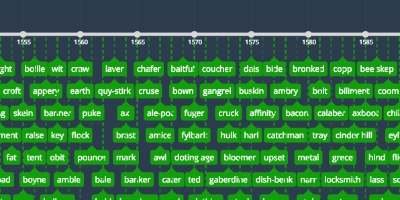1 Jan 1446 Jahr - stirk
Beschreibung:
The meaning could differ regionally and chronologically, but generally it meant a bullock or heifer up to two years old. 1292 <i>In equis, bovettis et stircis cxvijs vjd,</i> Bolton Priory (YRS154/44); 1346 <i>lego Elen? de Lathum iiijs et unum stirk</i>, Sutton on Derwent (SS4/19); 1446-58 <i>iij twynters j sterke j vacca</i>, Fountains Abbey (SS130/123); 1524 <i>certain styrkes delivered to the Cellerar of Fontance ... and seyn the burning of the same</i>, Kirkby Malzeard (YRS114/5); 1607 <i>with ten stirkes coming out of the calfe close</i>, Airton (DDMa). It was not unusual for the sex and age of the animal to be made clear: 1548 <i>to the saide Henrie Waddisworthe an oxe stirke,</i> Halifax (Crossley28); 1551 <i>6 stirk milk kye prised to £6,</i> Marske (YRS152/81); 1607 <i>7 yearing stirkes</i>, Brandsby (NYRO44/42). It remained active in the farmers’ vocabulary: 1816 <i>Jany 7th Stirk bulled at John Roberts</i>, South Crosland (GRD). Stirk is a well-established Yorkshire surname and the by-name provides an early example of the word: 1275 <i>Ricardus Styrke</i>, Sandal (YRS29/52). See GRDict.Zugefügt zum Band der Zeit:
Datum:
1 Jan 1446 Jahr
Jetzt
~ 579 years ago
